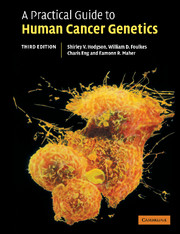Preface
Published online by Cambridge University Press: 20 August 2009
Summary
There continue to be rapid developments in our understanding of inherited cancer susceptibility and the importance of this for the translation of this knowledge into clinical practice. There appear to be differences in the pathways of carcinogenesis in individuals with differing inherited cancer susceptibility syndromes, which can lead to improved strategies for surveillance and management. Gene expression studies have revolutionised our understanding of many aspects of this. An example is that carriers of germline mutations in BRCA1 have breast cancers which have particular pathological characteristics which in turn can indicate an increased chance that a woman carries a BRCA1 mutation, and the fact that specific types of DNA damage repair is deficient in BRCA1 mutation carriers has led to the suggestion that cancers in such women may be more sensitive to treatment with cisplatin and PARP inhibitors. The discovery of MYH (MUTYH)-associated polyposis has highlighted the presence of autosomal recessive inheritance patterns for conditions originally thought to be predominantly autosomal dominant conditions.
The development of sensitive counselling practices for predictive testing for cancer predisposing conditions, taking into account the psychosocial, insurance and ethical issues has been continued as part of ongoing collaboration between different genetic centres and professionals. The inclusion of nurses and genetic counsellors in the development of cancer genetics services is essential, and training is taking this into account.
- Type
- Chapter
- Information
- A Practical Guide to Human Cancer Genetics , pp. xi - xiiPublisher: Cambridge University PressPrint publication year: 2006

